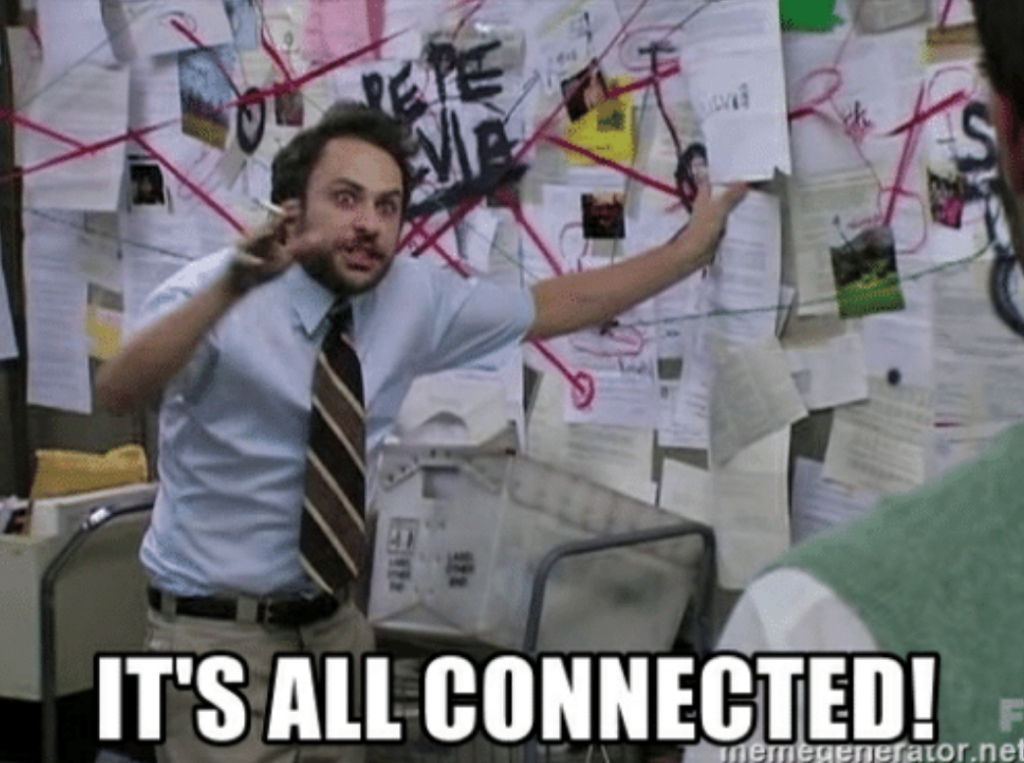
Deception is a marvelous technique for the seasoned storyteller. Once one masters the basic skills (check out my new plotting class), this then frees the artist to begin honing more highly advanced techniques for beguiling audiences.
Of all storytelling techniques, I believe my favorite is the unreliable narrator. Deception is key in order to successfully pull off this charade. No duh, right?
Yes, but easier said than done.
The one advantage we authors have going for us is that trust is one factor audiences assume as a given from the beginning.
Silly Reader, Tricks are aren’t just for kids.
Deception generally isn’t something readers expect, because narrators act as our guide and filter for the story. If the narrator doesn’t know something or show us something, it’s hard work for us to maneuver the fictional world.
We trust the narrator to be our guide in a world that is formed in the imagination of the author. Also, I’d venture to say most audiences don’t expect the unreliable narrator, simply because this sort of literary guide, proportionally speaking, is rare.
There are a number of reasons for this.
First, the unreliable narrator takes skill, tenacity and a certain amount of bravado to write. The author must use deception much like a magician, knowing when to hold back and when to let the rabbit out of the hat.
Also, good authors, like skilled magicians, must master more than one illusion to keep audiences hungry for more.
Deception is Anathema

In polite society we trust. When we ask a person their name, we assume they are telling us the truth. We buy a can of corn and trust that the can does, in fact, contain corn.
Trust is woven into the fabric of our everyday lives, thus we take it for granted.
We trust that when we sit in a chair it won’t collapse, that when we drive our cars, the wheels won’t spontaneously fly off in all directions, and that the stop lights are timed to make all of us safe.
This is where a seasoned author can contrive a story that can take advantage of this presumed trust. Since polite society comprises most of our audience, it’s reasonable to assume they’ll automatically trust the narrator, MC (main character), or protagonist of our story.
This trust is what we can then use to give them a story they’ll not soon forget.
Deception has Many Faces

There are all sorts of ‘unreliable narrators’ in fiction, which we’ll go over in far greater detail in my upcoming class. It is worth mentioning, however, that no narrator is ever 100% reliable.
This can be attributed to what psychologists refer to as the Kurosawa effect, also known as the Rashomon effect. The Rashomon effect is used to explain the unreliability of eyewitness accounts. Four people can witness the same murder, yet all have vastly conflicting versions of events.
They aren’t lying, just what each witness sees passes through a filter of their own experiences.
Deception and Great Stories

Some of the greatest stories ever penned have used the unreliable narrator. Even among the tomes of Sherlock Holmes, I strongly recommend The Valley of Fear.
Though the term ‘unreliable narrator’ wasn’t coined until literary critic Wayne C. Booth’s 1961 book, The Rhetoric of Fiction, it’s a device that’s been around a long time.
More recent books include Moriarty by Anthony Horowitz, Fight Club by Chuck Palahniuk, and American Psycho by Bret Easton Ellis. Then there is the incredible and game-changing Gone Girl by Gillian Flynn.
These are but a handful of books I mention that have rocked the literary world. If we look to movies there are many more examples: Vanilla Sky, Black Swan, Den of Thieves are but a few that come to mind.
While audiences might squeal at the deception, trust me. Deep down they LOVE it. If they didn’t? M. Night Shyamalan would have been working as a barista after The Sixth Sense.
More then Just a Twist

While unreliable narrators are fabulous for delivering fantastic twist endings (Eg. The Usual Suspects), they can serve many other functions and elevate your story to an entirely new level.
In a glutted marketplace, authors who go the extra mile to learn how to go above and beyond will stand out like a gem that’s washed up on a beach of broken shells.
The unreliable narrator is one of many devices to help your story outshine the competition. Stories that make audiences question their own perception make for some compelling page-turners.
Not only can the unreliable narrator offer insight into a unique perspective (Eg. that of a child), but it is a fantastic way of adding depth, crafting twist endings and also making it tougher for audiences to guess what might be coming at them next.
Deception as a Hook: What Are They Hiding?

I mentioned earlier that there are different types of unreliable narrators. Sometimes the deception will be so well-hidden we won’t notice it until the shock *BOOM * at the end when we never saw it coming (E.g. Den of Thieves).
Other times, however, we’ll sense the deception and this leads to more complex characters. It can pique the audience’s curiosity.
Why is the narrator misleading us? What does she have to hide? Why is he being so evasive? Is there more below the surface of this story?
The narrator’s prevaricating ignites our curiosity. We’re nosey. We want to know what they are hiding and why. This literary device makes the audience work a bit harder, to form their own opinions and conclusions since the narrator is not to be trusted.
So, for those of you who want to write the book that readers will be talking about long after they’ve turned the final page? Using an unreliable narrator is a tactic you might consider.
Why Choose an Unreliable Narrator?

Deception to Entice Reader Engagement
The unreliable narrator is a fantastic way to get the reader engaged (E.g. As I Lay Dying by William Faulkner). Granted, Faulkner is an extreme example. He uses fifteen different character POVs over fifty-nine chapters.
Each character describes the same event: ‘the death of Addie Bundren and her poor, rural family’s quest and motivations—noble or selfish—to honor her wish to be buried in her hometown of Jefferson, Mississippi.’
By using so many different POVs to narrate the ‘same story’, Faulkner is essentially using what we discussed earlier—the Rashomom effect—to show how truth and life are subjective.
Deception to Elevate Authenticity & Empathy
Since I don’t want to tell ALL in this blog post, I’ll offer up a couple of unreliable narrator types to illustrate my point.
The Madman

We’ve all heard the editor’s mantra, ‘Show don’t tell’ until we want to scream. It’s one thing to tell the audience a character is crazy, and a wholly different experience for them to be in the head of a character steadily losing his mind.
The best example I can think of is American Psycho, by Bret Easton Ellis. Granted, you can watch the movie. I did and was left going…huh? The screenwriters did their best, but when it comes to a psyche unraveling faster than a Walmart hoodie? I believe we must go to the written word.
It isn’t until we get into the head of Patrick Bateman that we get a front-row experience of someone steadily coming unstitched. Granted, it’s a gritty book, but once I read it, the movie made far more sense.
It also was a novel that left me reeling in that there are moments where one roots for Bateman. More than a few times, Bateman is the one voice of compassion in the heartless, self-centered Wall Street Yuppie culture that surrounds him.
Yet, as Bateman progressively spirals into madness, and it becomes harder and harder to discern up from down, I believe we have deeper empathy. Why? Because we’re IN his head.
We’re experiencing what it feels like to go mad, hand-in-hand, along with the MC. It’s this ‘front-row seat experience’ of what it’s like to lose one’s grasp on reality that makes the book so poignant.
The Innocent

Winston Groom’s Forrest Gump is a wonderful example of The Innocent Unreliable Narrator. Forrest leads this remarkable life from war hero, to Ping Ping Champion, to NASA astronaut and all these stories are questionable. Are they true? Do we even care?
This is left to the audience.
Forrest’s earnest unreliability, due to a limited I.Q., provides a mechanism for the audience to overlook his possible exaggerations. Because Forrest is so open and innocent, these attributes enhance the experience. We forgive the ‘deception’ because it emanates from a character we cannot help but love.
We cheer him on in the ultimate story of an underdog triumphing against impossible odds, and forgive and forget any possible embellishments.
Without Gump’s limited mental capacities and childlike purity, however, the story would lose the richness. The character wouldn’t have the depth and complexity that audiences have adored for generations.
In the End

These days, writing is more competitive than ever. The low-hanging fruit is all gone and it takes a lot to stand out with more than a million books being self-published every year.
In June of 2019, Barnes & Noble was sold to a hedge fund. I predicted that once that happened, they’d start closing stores and the rest of the big NYC houses would begin tumbling and being sold off.
This would then mean the big authors would start shifting their allegiances and that the remaining major publishing houses would topple like dominoes because they’d no longer be fiscally sound.
Mega-author Dean Koontz signed with Thomas Nelson (a division of Amazon) before the ink was even dry on Barnes & Noble’s deal with Waterstone’s.
Within a couple months other publishers were reorganizing to publishing solely nonfiction or educational books.
In December of 2019, Penguin Random House sold off its remaining USA shares, also claiming it was going to focus more on non-fiction and educational books.
And *sips Mimosa* Simon & Schuster has been put up for sale. ViacomCBS announced early March that, in light of plummeting profits, the book publisher is no longer essential to its business and has opened itself up for a buyer.
The Big Six are pretty much no more and B&N has closed all but 100 stores. I was going to blog about this but with COVID? Yeah, who needs more depressing news?
Sorry about this *rips bandage off quickly*
This said, we DO have to face that there will be a new publishing paradigm that will emerge out of all this mess. There’s some good news. We simply have to be prepared for that with great books and a strong platform and brand.
I’ll probably blog on all this later, but long story short? We have to write better books. Because when Stephen King’s publisher is up for sale? Yeah. Time to hustle! This isn’t the first time publishing has been completely renovated and won’t be the last. So take heart and get writing!
I LOVE Hearing From You!
What are your thoughts? Do you enjoy unreliable narrators? I really enjoy stories that keep me guessing. So many stories have become formulaic and predictable so it’s refreshing when I can’t quite figure everything out.
What about you? Do you have some favorites to add to the list?
I hope y’all will join me for my new plotting class tonight. COMPLETELY-MOSTLY new content  . Yes, we’ll cover some of the old, but I’ll also be covering structure types not ever discussed before.
. Yes, we’ll cover some of the old, but I’ll also be covering structure types not ever discussed before.
Trouble with Story-Worth Problems? NEW CLASSES to HELP!
There and Back Again: From Good Idea to Successful Novel
Class is TONIGHT, May 26th, 2020 from 7:00-9:00 P.M. and a recording (as always) is provided with class purchase. If you can’t make class tonight, youWILL get the recording. Price is $50 but use lockdown15 for $15 off.
The Unreliable Narrator: Turning the Reader’s World Upside Down
Class is June 4, 2020 from 7:00-9-00 P.M. and a recording (as always) is provided with class purchase. Price of the class is $50 but use lockdown15 for $15 off.
For those who want BOTH classes PLUS a BONUS class as well as an EXCLUSIVE and PRIVATE workshop? I offer you…
The Deep Dive Bundle: Two Classes & EXCLUSIVE Log-Line Workshop
Almost nine hours of training! This also includes working one-on-one in a private workshop with moi! Workshop ONLY available to bundle participants. No discount codes because the discount built into the pricing. Recordings included.
Can’t wait to see y’all in class!
On Demand Classes
Ah, very few remaining On Demand classes we’ve not yet purged from the servers so take advantage while they remain.
On Demand: Dark Arts, Building Your Villain
$50 but use lockdown15 for $15 off ($35)
The Edge: How to Write Mystery, Suspense, & Thriller
$50 and use lockdown15 for $15 off ($35)
Tick Tock: How to Write a Mystery Suspense Series
$50 and use lockdown15 for $15 off ($35)
The post Deception as a Storytelling Device: Introducing the Unreliable Narrator appeared first on Kristen Lamb.
